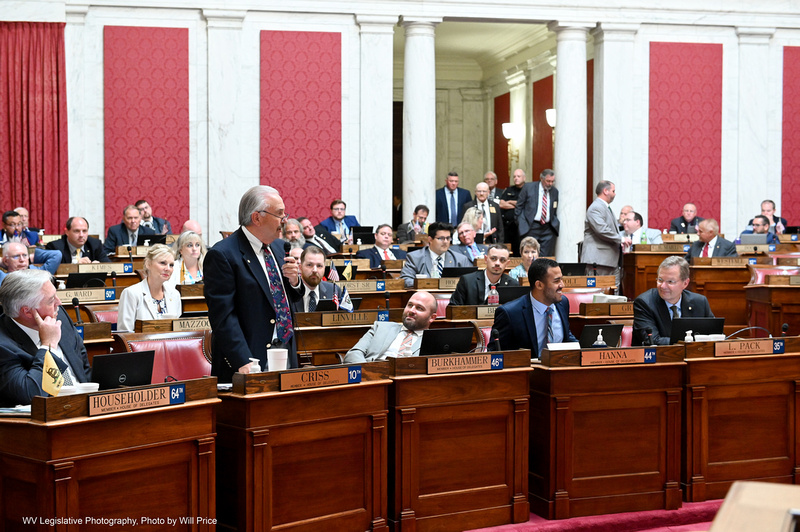West Virginia delegates passed an income tax bill pushed by Gov. Jim Justice by a wide margin, although some House members pushed for more ways to consider a property tax proposal backed by Senate leadership.
Now the income tax bill, House Bill 301, goes to the state Senate, where its viability remains unclear.
Senate leaders have said they support an income tax cut, but they have wanted to continue laying the groundwork for a personal property tax cut for automobiles and businesses’ machinery and inventory. Moving on that depends on the outcome of a November vote by citizens on a proposed constitutional amendment.
The Senate floor session is supposed to start at 1 p.m. Friday.

Governor Justice, in a statement today, thanked delegates for voting for the income tax cut and offered several paragraphs of criticism of the Senate property tax proposal.
“At the end of the day, what the Senate is proposing is ‘Build the field and wish and hope they come.’ That’s not wise. Reducing the personal income tax has been proven time and time again in many other states as an economic and population driver beyond belief,” said Justice, a Republican.
The governor talked about an income tax cut of about 10 percent for a few weeks and then announced a proposal to be considered in this week’s special legislative session — with the brackets for lower wage earners getting slightly higher breaks by percentage.
“I encourage the Senate to vote in favor of my proposal,” Justice stated.
The bill won broad support in today’s passage vote in the House of Delegates, 78-7.
Delegates voted down a series of amendments proposed by Democrats prior to the final vote.

Republican delegates had a long caucus today before today’s floor session started, and then Delegate Daniel Linville, R-Cabell, proposed holding off a day on a final vote on the tax proposal.
“We’ve seen this show many, many times. The House will pass an income tax cut, and I don’t want credit for trying — I want credit for doing. And I would like very much to make sure that we have adequate time to make sure we and the governor and the Senate are all on board,” Linville said.

He got backing from Delegate Jason Barrett, R-Berkeley, who advocated for more time to talk with the Senate.
“I support tax cuts, but it’s also very clear that we’ve been down this road before. We’ve passed this bill before, a very similar bill to it, and it doesn’t get taken up by the Senate. We are still in negotiations with the Senate to pass a bill that will provide tax relief to your constituents,” Barrett said.
“I think it’s very clear that a 10 percent personal income tax cut is not what the Senate wants to do, and therefore we should delay action one day.”
An overwhelming vote in favor of the income tax bill today, Barrett said, would send a clear message to the Senate and to the governor that House Bill 301 is truly the policy that delegates favor — and that would risk getting nothing at all.
If delegates want to actually pass a tax cut, Barrett said, “we need to delay action one day, continue negotiation and not throw our hands up and tell the Senate ‘We’re done negotiating; take it or leave it.'”

Delegate Vernon Criss, R-Wood, vice chairman of the House Finance Committee, argued against holding off.
“We were brought here by the governor on Monday at noon to take up a tax reform bill,” he said, going on to describe the bill’s journey through the legislative process. “Then let us send a bill to the Senate — that we we are here to do the work that we were brought to town to do so that we can go home.
“These tax reforms are very important to the State of West Virginia, this is the plan the governor has come up with and this is the plan we should be following.”

Also supporting a vote right away was Delegate Bill Anderson, R-Wood.
“I believe it’s time for this House to act; send the bill. Sending the bill to the Senate would not preclude further negotiations,” Anderson said. “I believe this bill needs to move to the Senate and let them clarify the situation with their amendments. I know there are people in leadership who have been negotiating with the Senate, but it’s time for us to act.”
The motion to postpone was defeated 78-4.

Later, right before a final vote on passage, Delegate Shannon Kimes, R-Wood, made a motion to refer the tax bill to the House Government Organization Committee. The bill had been reviewed already by the House Finance Committee.
“Fact of the matter is, I think we need a different team to go to these negotiations and try to get a deal done,” Kimes said. “A lot of times these bills go to two committees. This one, I don’t believe, has. Let’s send in another team that might reach a deal with the Senate.”
He concluded, “Let’s send in somebody that might actually want to get a deal done.”
His motion was defeated 71-10.
In arguing against the Kimes motion, Criss referred to the possibility of more twists and turns to come.
“We need to pass this on, send it to the Senate and then if there is a difference we have a conference committee,” Criss said.


